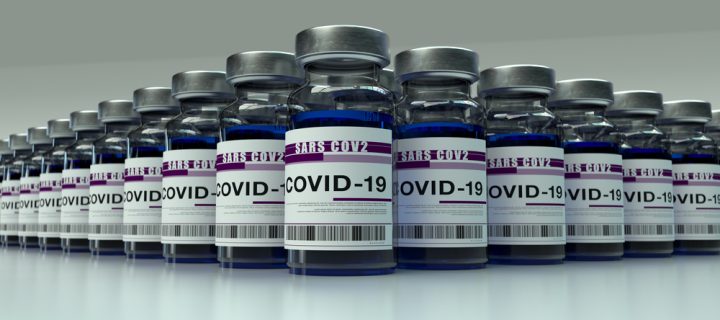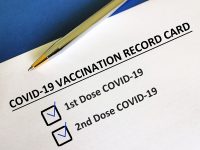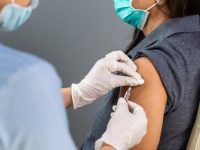The elderly and healthcare workers will likely be first, followed by other essential workers, and everyone else by June.
According to eager estimates, people living in the US could have access to a coronavirus vaccine for emergency use as soon as December 12, 2020. That’s in less than a couple of weeks at the time of this writing. No doubt, many of us are wishing to be first in line. The big question is, however, who will be prioritized?
According to news reports, the Advisory Committee on Immunization Practices is issuing guidance to all states on this matter. Who should get priority access will be decided on a state-by-state basis. It will likely be slightly different on rollout depending on where you live.
Likely Groups to Go First
In general, federal officials seem to be indicating that American healthcare workers and elderly people living in long term care residences are the most likely to be the first to get the COVID-19 vaccine, across the country. As Dr. Nicole Saphier, an American radiologist and medical contributor to Fox News has pointed out, just 1% of the US population lives in long term care accommodations. Deaths in these residences have sadly accounted for somewhere between 35% and 40% of all coronavirus deaths in the country, however. Naturally, this group’s COVID-19 vulnerability places them at the head of the line.
The country’s 21 million healthcare workers will also come first. Who comes after these two groups could vary state-to-state. There are about 87 million essential workers across the US. These people are working in professions like trucking, retail, and teaching, and it is likely they will follow.
Related: Do Coronavirus Curfews Work?
The needs of each state can vary depending on the industries that dominate its landscape. For example, officials in Colorado have mentioned they may prioritize ski industry workers. These are people who are currently living in shared housing, the perfect petri dish for COVID-19 to spread. People working in meat packing plants and other highly populated industries could also come near the top of the vaccination list.
What if you have already had the virus? At the time of this writing, the CDC has not issued guidelines surrounding whether or not people who have had COVID-19 should also get the vaccine. Since it remains uncertain how long you have immunity to the virus once you recover from it, it could very well be that everyone will be advised to be inoculated.
A Timeline: What Will Happen and When
What about the rest of the US population? According to Dr. Saphier, officials from Operation Warp Speed are hopeful everyone who wishes to be vaccinated against COVID-19 will be able to do so by June of 2021. Sounds ambitious! All we can say is, buy your travel tickets for next summer now before those prices really hit the roof.
What about the short term? Both Moderna and Pfizer are seeking emergency approval of their COVID-19 vaccines from the FDA. On December 10, the Administration will meet to consider approving Pfizer’s vaccine. It will convene again on December 17 to discuss approving Moderna’s. Once either of these vaccines is approved for emergency use, Health Secretary Alex Azar has stated they will be ready to ship within 24 hours.
What ‘Emergency Use’ Means
When a drug is approved by the FDA for ’emergency use’ this means it can be used to treat patients while still being analyzed in clinical trials. Yes, there is always some risk involved in this. Using a drug that has not yet cleared the final stages of its studies could potentially lead to health complications. How dangerous is this? For now, that is for others to decide. In the case of the COVID-19 vaccine, the FDA is weighing all sides of the issue. They will determine whether the benefits of using a particular vaccine to protect the most vulnerable in society outweigh the risks. If the answer is ‘yes’, the country gets to have it for emergency use.
What Will It Cost?
The short answer is, likely not much. According to the CDC, the vaccines will essentially be free of cost. Administering them could come with a price tag, however. You may end up paying for the service of getting a shot. You will not be paying for the actual contents of the needle, however. This fee might be reimbursed by health insurance companies and programs like Medicare and Medicaid. The details still remain uncertain.
Will the US Attain Herd immunity?
Herd immunity is a type of indirect protection against an infectious disease. When enough people have become immune to the infection either by being vaccinated against the illness or by becoming infected with it, this is good news. You become less likely to catch the illness. Your “herd”, or community, protects you.
The good news is, herd immunity can be attained. The US has been free of polio since 1979, for example. This is because the population receives the polio vaccine in childhood. These days, polio is simply not being spread around the US. The US now has ‘herd immunity’ when it comes to the illness.
Related: This is Dr. Moncef Slaoui, the US Vaccine Leader
What about COVID-19? It’s possible. Officials are saying that about 70% of the US population would need to be vaccinated against it for the country to achieve herd immunity. A Gallup poll published in November 2020 indicated that 58% of Americans said they would get the COVID-19 vaccine. Essentially, there are still some people to convince before the nation can be in the clear.
The world can achieve a lot. Pfizer has committed to delivering 1.2 billions of doses of its coronavirus vaccine globally in 2021, alone, and there are other participants. That’s amazing. At the time of this writing, there are 63.8 million documented cases of COVID-19 around the world, and 1.48 million deaths, over 269 000 of which were in the US. If the country pulls together, a vaccine can put an end to the infections.
photo credits: ratlos/Shutterstock.com











